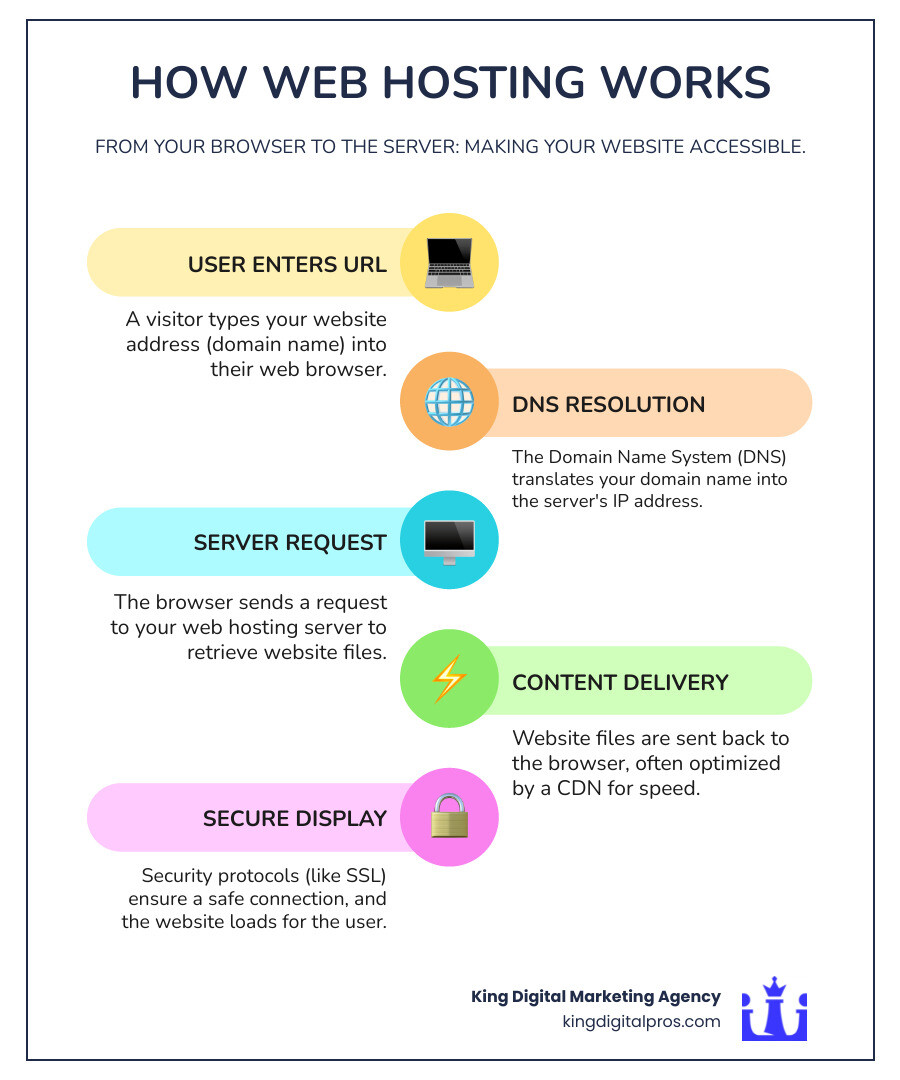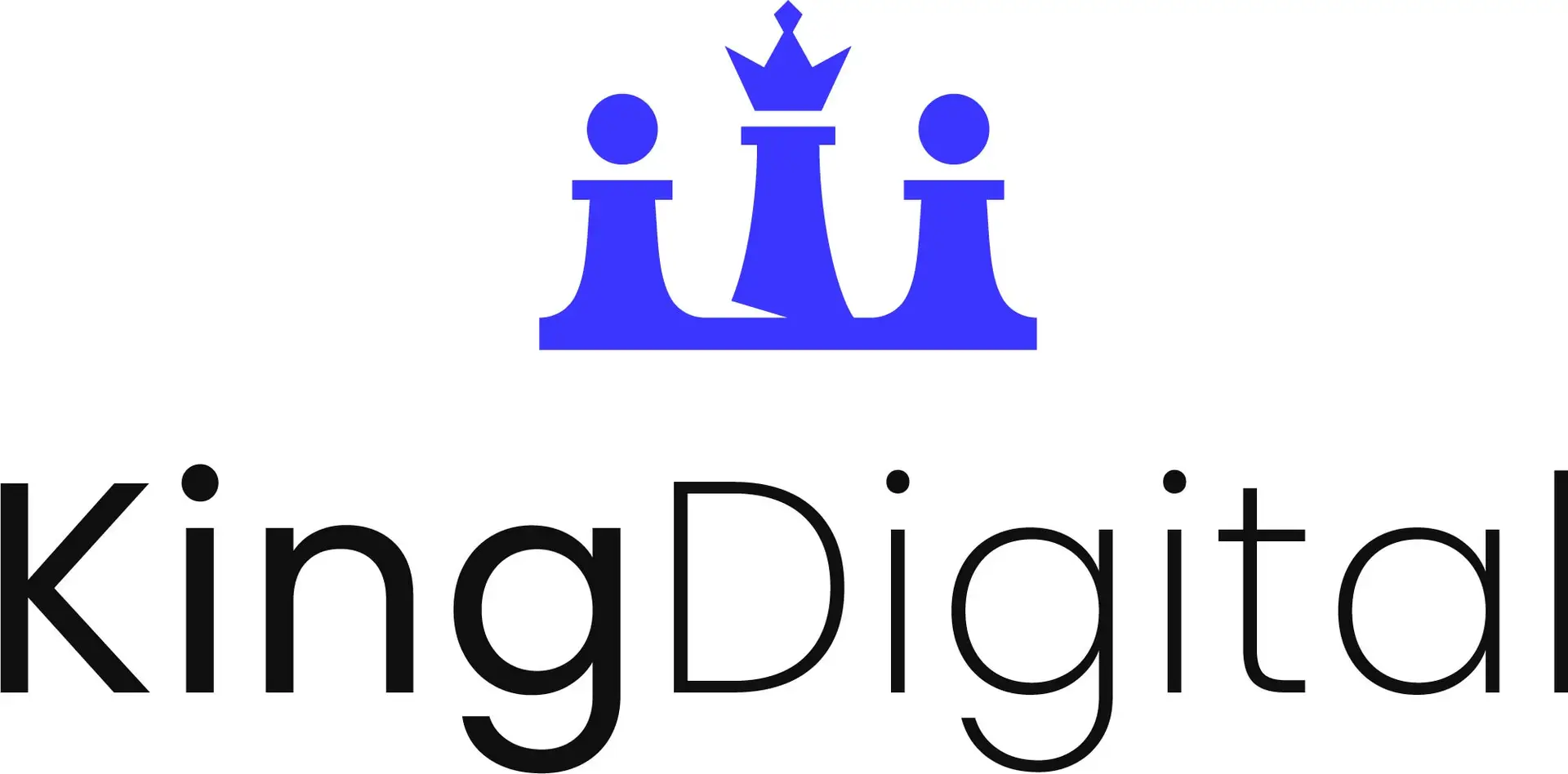Why Your Online Foundation Matters
Small business hosting is the digital foundation that keeps your website accessible to customers 24/7. Here are the key hosting types and what they offer:
Top Small Business Hosting Options:
- Shared Hosting – $3-15/month, perfect for new businesses and blogs
- VPS Hosting – $20-100/month, ideal for growing businesses needing more control
- Managed Hosting – $30-200/month, hands-off solution with expert support included
- Dedicated Hosting – $100+/month, maximum performance for high-traffic sites
Your website is often the first impression customers have of your business. When someone searches for your services and clicks on your site, web hosting determines whether they see your content instantly or stare at a loading screen. Poor hosting can mean lost customers, damaged credibility, and missed opportunities.
Think of web hosting like renting office space for your business. Just as you wouldn’t choose a building that’s frequently locked or hard to find, your website needs reliable hosting that keeps your digital doors open. The difference between good and poor hosting can be the difference between a thriving online presence and an invisible one.
Quality hosting impacts every aspect of your online success – from search engine rankings to customer trust. Fast loading times, reliable uptime, and strong security aren’t just technical details – they’re business essentials that directly affect your bottom line.
I’m Bernadette King, and through my work with King Digital Marketing Agency, I’ve helped countless franchise owners and small businesses build strong online foundations through strategic small business hosting decisions and comprehensive digital growth strategies. Understanding how hosting choices impact everything from SEO performance to customer experience has been crucial in changing visibility into sustainable growth for my clients.

Core Features of High-Performance Small Business Hosting
This section covers the non-negotiable elements that define quality hosting and directly impact your business’s success, from keeping your site online to ensuring a fast and secure user experience.
Uptime and Reliability: The Cornerstones of Trust
Imagine your physical storefront suddenly closing its doors without warning. That’s what happens when your website experiences downtime. Uptime, quite simply, is the percentage of time your website is live and accessible online. For any small business hosting solution, a high uptime guarantee is non-negotiable. We look for providers offering at least 99.9% uptime, which means your site should be down for less than 8.76 hours in an entire year. Many top providers even boast 99.95% uptime guarantees, ensuring your digital presence is nearly always available. For businesses with critical online operations, some providers even guarantee 100% uptime, with continuous server monitoring often every two minutes to catch and resolve issues rapidly.
Reliability isn’t just about avoiding downtime; it’s about building and maintaining customer trust. If a potential customer clicks on your link and finds your site unreachable, they’re likely to bounce to a competitor. This isn’t just frustrating; it’s lost revenue and damaged credibility. A truly reliable host ensures consistent performance, allowing your customers to access your services whenever they need them. It’s peace of mind, knowing your online doors are always open for business. More info about our reliable services
Performance and Speed: Don’t Keep Your Customers Waiting
In today’s digital world, patience is a virtue few online users possess. If your website takes too long to load, visitors will simply leave. This isn’t just anecdotal; slow page load speeds directly impact user experience and search engine rankings. Google prioritizes fast-loading sites, so a sluggish website can hurt your SEO efforts, making it harder for customers to find you. We’ve seen average response times for quality hosting providers range between 450ms and 625ms – that’s less than a second!
To achieve this kind of speed, your small business hosting needs robust technology under the hood. Look for hosts utilizing Solid State Drives (SSD) or, even better, Non-Volatile Memory Express (NVMe) storage. These are significantly faster than traditional Hard Disk Drives (HDD), leading to quicker data retrieval and faster page loads. Additionally, a Content Delivery Network (CDN) is a game-changer. A CDN stores cached versions of your website’s content on servers located around the world. When a user visits your site, the content is delivered from the nearest server, drastically reducing load times, especially for geographically dispersed audiences. This means your Canadian customers get blazing fast speeds from a Canadian server, while your American customers get the same from a US server. It’s like having multiple digital express lanes for your website! Is Your Website Converting?
Security and Support: Your Digital Safety Net
When you run a small business, your website isn’t just a brochure; it’s often a hub for customer data, transactions, and sensitive information. Protecting this digital asset is paramount. A robust small business hosting plan includes essential security features to safeguard your site and your customers.
Here’s a list of key security features to look for:
- Free SSL Certificates: These encrypt the connection between your website and your visitors, protecting data in transit. They also signal to browsers that your site is secure, which is crucial for building trust and for SEO. Many reputable hosts include these for free.
- Malware Scanning and Removal: Regular scans identify and eliminate malicious software that could harm your site or steal data. Some providers offer proactive malware protection.
- Automated Daily Backups: Accidents happen, and data loss can be catastrophic. Automated daily backups ensure that if anything goes wrong – whether it’s a hack, a plugin conflict, or human error – you can quickly restore your site to a previous, healthy state. Many providers, for example, emphasize their backup solutions.
- Web Application Firewall (WAF): A WAF acts as a shield, filtering and monitoring HTTP traffic between a web application and the Internet. It protects your website from common web attacks like SQL injection and cross-site scripting.
- DDoS Protection: Distributed Denial of Service (DDoS) attacks can overwhelm your website with traffic, making it inaccessible. Good hosting providers offer protection against these disruptive attacks.
Beyond security features, reliable customer support is your lifeline. Even the most tech-savvy business owner can run into unforeseen issues. A host with 24/7 customer support via live chat, phone, or email means help is always just a few clicks or a call away. Some hosts boast impressive support metrics, like average resolution times of under 3 minutes or satisfaction rates exceeding 95%. This level of responsiveness can be the difference between a minor hiccup and a major crisis for your business. We believe that when it comes to your website, you should never be left in the dark.
Choosing the Right Type of Web Hosting for Your Needs
Not all hosting is created equal. The right choice depends on your business’s size, traffic, technical expertise, and budget. Here’s a breakdown of the most common types.
Shared Hosting: The Budget-Friendly Starter Pack
Picture moving into your first apartment – you’re sharing utilities, hallways, and maybe even dealing with that neighbor who plays music a bit too loud. That’s exactly what shared hosting is like for your website. Multiple websites live on the same server, sharing resources like processing power, memory, and storage space.
The beauty of shared hosting lies in its affordability. You can get started for as little as $2-5 per month, making it incredibly attractive for new businesses testing the waters online. It’s perfect for small websites, personal blogs, or businesses just starting their digital journey.

Most shared hosting plans come with user-friendly control panels and one-click installers for popular platforms like WordPress. You don’t need to be a tech wizard to get your site up and running. However, there’s a trade-off. When your “digital neighbors” experience traffic spikes, your site might slow down too. Think of it like rush hour in your apartment building’s elevator – everyone’s trying to use the same resources at once.
Shared hosting works beautifully for new websites and blogs with moderate traffic, but it has limited scalability. If your business takes off and your website traffic explodes, you’ll eventually outgrow this cozy shared space.
VPS (Virtual Private Server) Hosting: The Scalable Upgrade
If shared hosting is like renting an apartment, VPS hosting is like owning a condo. You’re still in a building with others, but you have your own dedicated space with guaranteed resources that nobody else can touch.
A Virtual Private Server takes one powerful physical server and divides it into several independent virtual servers. Each VPS gets its own slice of CPU power, RAM, and storage space. This means your website’s performance won’t suffer when other sites on the server get busy.
VPS hosting gives you increased control and flexibility that shared hosting simply can’t match. You get root access to your server, which means you can install custom software, adjust configurations, and truly make the server work the way your business needs it to. It’s like having the keys to customize your digital space however you want.
This hosting type is ideal for growing businesses and e-commerce sites that need more reliability and performance. While it does require moderate technical skill to manage effectively, the benefits often outweigh the learning curve for ambitious small businesses ready to take their online presence seriously.
Managed Hosting Solutions: The Hands-Off Approach
Let’s be honest – not every business owner wants to become a server management expert. That’s where managed hosting becomes your digital lifesaver. Think of it as having a full-time IT team working behind the scenes, except you don’t have to worry about hiring, training, or managing them.
With managed hosting, your provider handles all the technical heavy lifting. They take care of server management, automatic updates and patches, proactive security monitoring, and performance optimization. You get to focus on what you do best – running your business – while expert support keeps your website running smoothly.
This hands-off approach is particularly valuable for businesses without in-house technical expertise. Instead of spending hours troubleshooting server issues or staying up late applying security patches, you can trust that professionals are handling everything. Your website stays secure, fast, and up-to-date without you lifting a finger.
While managed hosting typically costs more than shared or unmanaged options, the time savings and peace of mind often justify the investment. When you calculate the hours you’d spend managing technical issues yourself, managed hosting frequently pays for itself. SEO Friendly Website Design
The key is matching your hosting choice to your business’s current needs while keeping an eye on future growth. Start where you’re comfortable, but don’t be afraid to upgrade as your business evolves.
Practical Considerations: Budget, Migration, and Strategy
Beyond the technical specs, practical factors like cost, the process of moving your site, and the benefits of specialized providers play a huge role in making the right decision.
Cost Considerations for Small Business Web Hosting
Understanding small business hosting pricing can feel like trying to decode a mystery novel. Those eye-catching ads promising hosting for just $2-3 per month? They’re real, but there’s more to the story. These are typically introductory rates that jump significantly when it’s time to renew. Think of it like a gym membership special – great to get you started, but the real cost comes later.
The good news is that many providers sweeten the deal with genuine value-adds. Free domain names for the first year and complimentary SSL certificates can save you $15-20 annually on the domain alone, plus another $50+ on SSL security. Just remember that “free” domains usually renew at standard rates, and there might be fees if you decide to switch providers early.
Hidden fees can be the real budget killer. Some hosts tack on charges for basic features like backups, security scans, or even customer support. Some providers have built their reputation on transparent pricing with no surprise charges – a refreshing approach in an industry where fine print matters.
For most small businesses, budgeting $10 to $50 per month for quality shared or VPS hosting makes sense. If you need managed solutions or dedicated servers, expect costs to climb above $100 monthly. It’s a significant investment, but consider it foundational – like rent for your digital storefront. As Forbes wisely notes in their guide on Eight Things To Consider Before Investing In SEO, hosting costs are a fundamental part of your online marketing strategy.
| Hosting Type | Monthly Cost (Intro) | Key Features | Best For |
|---|---|---|---|
| Shared Hosting | $2-15 | Basic features, shared resources, easy setup | New websites, blogs, low traffic sites |
| VPS Hosting | $20-100 | Dedicated virtual resources, more control, scalable | Growing businesses, moderate traffic |
| Managed Hosting | $30-200 | Full server management, automatic updates, premium support | Business owners who want hands-off approach |
| Dedicated Hosting | $100+ | Maximum performance, full server control, high security | High-traffic sites, enterprise needs |
The cheapest option isn’t always the smartest choice. While you might accept certain limitations when budget is tight, investing in quality small business hosting pays dividends through better performance, security, and customer experience.
How to Migrate Your Website to a New Host
Moving your website to a new host doesn’t have to feel like relocating your entire business. Think of it more like moving to a better neighborhood – with the right help, it’s actually quite straightforward.
The migration dance typically follows these steps: backing up all your website files and databases from your current host, transferring everything to your new hosting account, configuring your site on the new server (including any WordPress installations or custom applications), updating your DNS to point to the new server, and finally testing everything thoroughly to ensure nothing broke in the move.
Here’s where many quality hosts really shine. Free migration services have become standard among many reputable providers. Their expert teams handle the technical heavy lifting, often guaranteeing zero downtime during the transfer. It’s like having professional movers for your digital assets.
The DNS update phase requires a bit of patience. Once you point your domain to the new server’s nameservers, it takes 24-48 hours for these changes to propagate across the internet. During this time, some visitors might still see your old site while others see the new one – perfectly normal!
Post-migration testing is crucial. Check that all your pages load correctly, forms work properly, and any e-commerce functionality operates smoothly. Many hosts provide staging environments where you can test everything before making the final switch.
Our recommendation? Always take advantage of free migration services when available. They save you time, reduce stress, and minimize the risk of something going wrong. For more insights into our migration process and other technical topics, explore More on our process in our Blog.
The Advantage of a Canadian-Based Provider
For Canadian small businesses, choosing a Canadian small business hosting provider offers advantages that go beyond just patriotic pride. Geography matters in the digital world, and having your server located closer to your primary audience can significantly boost website performance for Canadian visitors.
When your server sits in Toronto, Vancouver, or Montreal instead of Texas or California, data travels shorter distances, reducing loading times for your local customers. This improved speed isn’t just about user experience – it’s also an SEO advantage, as Google factors page speed into search rankings.
Data sovereignty represents another compelling reason to keep your hosting Canadian. When your business data stays within Canadian borders, it remains subject to Canadian privacy laws and regulations. For businesses handling sensitive customer information, this provides legal clarity and peace of mind that’s increasingly valuable in our privacy-conscious world.
Local customer support brings practical benefits too. Canadian-based support teams understand Canadian business hours, holidays, and market nuances. When you need help at 9 AM Eastern time, you’re talking to someone who’s also starting their Canadian workday, not someone halfway through their night shift.
While the digital world operates on global standards – many open-source tools are governed by licenses like the GNU General Public License that promote worldwide collaboration – the physical realities of server location and local legal frameworks remain highly relevant for businesses serving Canadian markets.
The combination of faster local performance, data sovereignty, and culturally aligned support makes Canadian hosting providers an attractive option for businesses focused on serving Canadian customers effectively.
Frequently Asked Questions about Small Business Hosting
What is the difference between a domain name and web hosting?
Think of your domain name and web hosting like your business’s physical location. Your domain name (like yourbusiness.com) is essentially your street address – it’s how people find you online. Your web hosting, on the other hand, is the actual building where your business operates.
Without your domain name, customers can’t find your website. Without web hosting, you have nowhere to put your website files, images, and content. You absolutely need both to have a functioning website that people can visit.
Here’s a simple way to understand it: when someone types your domain name into their browser, that request gets directed to your web hosting server, which then serves up your website files to their screen. It’s like someone asking for directions to your store – the domain name gives them your address, and the hosting is the actual storefront they’ll find when they arrive.
How much should a small business budget for web hosting?
The honest answer is that small business hosting costs can vary quite a bit, but there’s good news – you don’t need to break the bank to get started. Most small businesses can expect to budget anywhere from $10 to $50 per month for quality shared or VPS hosting that will serve them well.
Here’s where it gets interesting though. You’ll often see those eye-catching introductory prices – sometimes as low as $2.95 per month. These are real deals, but remember they’re usually promotional rates for your first term. When it comes time to renew, prices typically jump up to the regular rates.
For businesses just starting out, shared hosting in the $10-20 range works perfectly fine. As you grow and need more power, VPS hosting typically runs $20-50 monthly. If you want the hands-off approach with managed hosting, you’re looking at $30-100+ per month, but that includes expert support and maintenance.
Dedicated servers start around $100 monthly and go up from there. The key is matching your hosting to your actual needs, not just going for the cheapest option. According to Forbes, there are several important factors to consider before investing in your online presence, and hosting is a foundational piece of that puzzle.
Do I need technical skills to manage my web hosting?
This is probably the most common concern I hear from small business owners, and here’s the reassuring truth: you don’t need to be a tech wizard to have great web hosting.
The hosting industry has really evolved to meet business owners where they are. Managed hosting solutions are specifically designed for people who want their website to just work without having to think about server maintenance, security updates, or technical troubleshooting. These providers handle all the behind-the-scenes work while you focus on running your business.
Most hosting providers also offer user-friendly control panels that make common tasks like setting up email accounts or installing WordPress as simple as clicking a few buttons. Many even provide one-click installers for popular platforms.
Now, if you’re considering unmanaged VPS or dedicated servers, that’s where some technical knowledge becomes helpful. These options give you more control and flexibility, but they also put you in the driver’s seat for maintenance and troubleshooting. You’ll be responsible for things like security patches, software updates, and server configurations.
The bottom line? Start with what matches your comfort level. There are excellent small business hosting options for every skill level, from complete beginners to tech-savvy entrepreneurs who enjoy having full control over their server environment.
Conclusion: Build Your Business on a Solid Digital Foundation

Choosing the right small business hosting solution is far more than a technical decision; it’s a strategic investment in your online future. Your web host serves as the invisible backbone of your digital presence, influencing everything from how quickly your site loads to how secure your customer data remains. We’ve seen how essential uptime, speed, security, and reliable support are for fostering customer trust and optimizing your search engine visibility.
Whether you’re starting with a budget-friendly shared hosting plan, scaling up to a powerful VPS, or opting for the convenience of a fully managed solution, aligning your hosting choice with your business goals is paramount. A strong online presence begins with the right technical choices, ensuring your digital doors are always open, welcoming, and secure.
At King Digital Marketing Agency, we understand these complexities and specialize in helping businesses like yours thrive online. From optimizing your Google Business Profile to ensuring your website has the robust foundation it deserves, we’re here to help you steer the digital landscape. A solid web host means your website is not just surviving online, but truly succeeding. Learn more about our Website Hosting and Maintenance services and let us help you build that unshakeable digital foundation.


